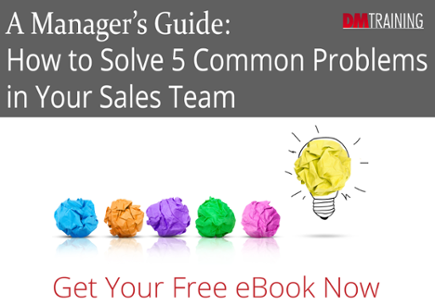4 Steps to an Effective Sales Strategy
Many CRMs fail to recognize the most important piece of information for any successful sales deal: the strategy. Recording the who, what, and when is pretty commonplace, but the “how” tends to get left by the wayside.
Sales managers should expect a coherent strategy from all of his/her salespeople for every deal that’s being pursued. It’s much more difficult (and often impossible) to get from “here to there” without a proper strategy.

Here are 4 keys to making every strategy an effective one:
1. Be realistic.
Since most salespeople are pretty good at “selling themselves”, it’s easy to fall into the trap of creating expectations that simply cannot be achieved.
Sales managers appreciate ambition, but not to the point that it defeats the chances of success.
There’s always plenty of evidence that will give you a solid guide as to what can be achieved on any given deal.
It’s critical that your proposal is not dismissed as “outlandish” by your prospect—asking a potential buyer to spend $1 million with you when it’s pretty well known that $100K is all they have ever spent with your company, for example.
2. Set time parameters for every stage of the deal.
In any negotiation, whoever “controls the clock” tends to win the game. Sales managers always want to know when a deal is likely to close, and it’s a salesperson’s responsibility to control that as much as he/she possibly can.
The time parameters of any given deal may need to be set in consultation with the buyer, as opposed to being arbitrarily set by the salesperson.
Reaching milestones that you have in place provide tangible evidence that you are actually getting to a deal. That’s good assurance for all.
3. Don’t confuse tactics for strategy.
Tactics are the specific actions you plan to take to support the plan.
It’s vital to have the strategy in place before deciding what tactics will work best to carry it out.
Tactics are those things that you can practice and refine, such as presenting, negotiating, employing data, etc. Strategy is the game plan.
Any time those two are confused, the outcome will inevitably be compromised.
4. Be willing to course correct quickly.
Once it’s “game on”, the conditions on the ground may require (or demand) that you alter your strategy.
While it’s important to anticipate what the landscape will look like, it’s even more so to read it properly once the deal making is underway. Buyers and prospects will give you ample clues as to what’s really going on, and the competition will too.
Hanging on to your original strategy for no other reason than pride is a huge mistake.
Once you realize that there are factors in play that will defeat your objective of making the sale, then it’s time to adjust your game plan to address them. Don’t delay!
Markets for all goods and services are now changing very rapidly. A strategy that may have worked as recently as yesterday might not work as soon as tomorrow. Both sales managers and salespeople need to accept that reality and deal with it accordingly.
About the Author

Buff Parham is a widely recognized thought leader and outstanding coach in the media sales and sales management field. With 35 years of sales experience, Buff has worked at Univision, FOX, Belo, ABC and CBS. He believes that hard work matters and that raising the bar and having greater expectations tend to generate greater results. In his spare time, Buff finds cooking and playing golf to be two of the best therapies for a somewhat hectic existence!
Connect with Buff via LinkedIn
Check out Buff’s Blog www.BuffParham.com
Follow @BuffParham
About Steve Bookbinder
Steve Bookbinder is the CEO and sales expert at DMTraining. He has delivered more than 5,000 workshops and speeches to clients all over the world and has trained, coached, and managed more than 50,000 salespeople and managers. Steve continuously refreshes his training content to reflect his latest first-hand observations of salespeople across industries and regions. Through him, participants in his workshops and coaching sessions learn the best practices of today’s most successful sellers and managers across industries. Steve understands that sales is a competitive game. To outperform competitors and our own personal best results, we need to out-prospect, out-qualify, out-present and out-negotiate everyone else, not merely know how to sell. Through his specialty programs in Pipeline Management, Personal Marketing, Great First Meetings, 2nd-level Questioning, Sales Negotiating, and Sales Coaching, Steve trains sales teams to master the skills they need to overcome the challenges they face in today’s world… and keep improving results year over year.





